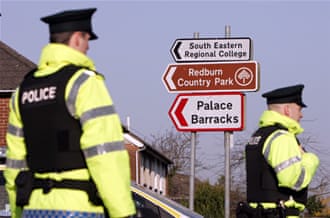Group’s culture of summary justice is back in Northern Ireland’s spotlight after new sexual assault accusations.

Maintaining law and order in Belfast during the violent days of the Troubles – the 30-year-long conflict in Northern Ireland – was no easy task.
Anti-police graffiti was a common sight on walls across the city. Many hardline Irish republican neighbourhoods were no-go areas, where police officers would seldom tread, and even more rarely be called in by locals to investigate crimes.
In the absence of an effective police force, paramilitaries on both sides became the law in parts of Northern Ireland. Their justice was often rough and ready. Suspects were tried in secret without legal protection. Sentences could range from a curfew to a bullet in the head.
The Troubles in Northern Ireland are over. Former rivals Sinn Fein, the political wing of the Irish Republican Army, and the staunchly pro-British Democratic Unionist Party now share power in Belfast.
But more than a decade and a half since the signing of the Good Friday Agreement, the issue of paramilitary justice is back on the Northern Irish political agenda.
Earlier this month, Mairia Cahill, a 33-year-old former junior Sinn Fein official and relative of former IRA chief of staff Joe Cahill, went public with claims that a prominent republican in west Belfast had raped and sexually abused her when she was 16. Shortly afterwards the IRA, Cahill said, conducted its own inquiry into her accusations, acquitting her alleged attacker, and warning her not to go to the police.
| The police were seen as the enemy. The more republicans attacked the police, the less the police could do normal cops-on-the-beat stuff and the more the pressure came on the IRA to take action against hoods. |
Knee-capping suspects
Such IRA-led extra-judicial investigations were part of life in Belfast during the Troubles, says Anthony McIntyre, a former IRA prisoner in the 1980s.
“The police were seen as the enemy. The more republicans attacked the police, the less the police could do normal cops-on-the-beat stuff and the more the pressure came on the IRA to take action against hoods,” says McIntyre, author of Good Friday: The Death of Irish Republicanism.
“Hoods” in Belfast parlance means anybody engaging in anti-social behaviour, from minor thieves and joyriders to drug dealers and, in some cases, perpetrators of sexual crimes. In republican areas, the IRA’s “Civil Administration Team” was charged with dealing with suspected offenders, and handing out sentences that had been approved in advance by the organisation’s Army Council. Punishment included expulsion from the area, to having kneecaps shot, and also summary execution.
Sinn Fein leader Gerry Adams joined the IRA Army Council in 1977. Last year, Adam’s younger brother, Liam, was jailed for 16 years for raping his own daughter.
McIntyre says sexual abusers were often moved out of republican areas to safeguard the reputation of the movement. “The IRA could have publicly tarred and feathered sexual abusers, but they didn’t. They spirited them away not because they liked them, but because they wanted to protect the organisation.”
“Community policing” was not a role the IRA welcomed because it diverted time and resources, says McIntyre, but the organisation felt “that if they didn’t respond [to criminal behaviour], they would risk losing support”.
The Cahill case is not the first time that attention has focused on the IRA’s role as community enforcers since the peace process began in 1994. In the mid-1990s, an IRA front organisation, Direct Action Against Drugs, was responsible for a spate of killings of major players in the Irish drug scene.
In 2005, the murder of Robert McCartney following an argument in a Belfast bar provoked outrage. The killing of west Belfast mother-of-10 Jean McConville in 1972, and subsequent IRA cover-up, remains a live issue. Community leaders frequently decry the so-called “punishment beatings” that are still prevalent in some republican areas.
 |
| In the absence of an effective police force, paramilitaries on both sides became the law in parts of Northern Ireland [EPA] |
‘Republican royalty’
But the detailed allegations made by Mairia Cahill are of a different order to previous criticism, says Paddy Hoey, a lecturer in media at Edge Hill University in London.
“This is republican royalty going against one of the top men in republicanism. It is an expression of the thought policing that goes on in west Belfast. Someone who could have gone to the police but didn’t because she was worried about the damage it would have done,” says Hoey.
By the late 1990s, when Cahill’s alleged abuse occurred, west Belfast had effectively been a “state-within-a-state” controlled by Sinn Fein and the IRA for almost two decades. The area even had its own radio stations and newspapers that were used to maintain discipline and were turned against anyone who spoke out.
“The full force of the republican movement as a pseudo-state in west Belfast or Derry would come down against you,” says Hoey. “Part of the reason that victims of these kind of crimes didn’t come forward was because of the power that was centralised in an elite [in the republican movement].”
| Everyone is talking about it, but one day they won’t. The question is what damage is done in the meantime. |
McIntyre says he remembers when his home in west Belfast was picketed in 2000. “My wife was six months pregnant and we had the IRA outside the door. It was all because I had said that the IRA had killed Joseph O’Connor [an anti-peace process republican shot dead in 2000].”
This kind of “direct policing” is less widespread in Northern Ireland now. The IRA has disappeared off the streets of Belfast. Since 2007, Sinn Fein has officially supported the Police Service of Northern Ireland.
Sinn Fein is fabled for its loyalty and discipline. But these characteristics, so essential in a war setting, have proved damaging in peacetime.
“The main threat to republicanism in the age of the peace process hasn’t come from the government. It’s come from within the republican movement, from control and abuse and cover-up,” says Hoey.
Culture of summary justice
The vicious beatings and intimidation that characterised “community policing” have returned to some areas where anti-peace process republicans have a significant presence. About half of paramilitary-style punishment shootings in Northern Ireland in 2013-14 were carried out in west Belfast, according to police statistics.
In Derry, dissident group Republican Action Against Drugs (RAAD) has carried out dozens of punishment attacks in recent years. The group claimed responsibility for the murder of Derry man Andrew Allen across the border in Donegal, in the Irish Republic, in 2012. RAAD has even carried out non-lethal punishment shootings by appointment, with parents instructed to drop children off and wait while they are shot.
Mairia Cahill’s testimony has shone a spotlight on the culture of summary justice in republican areas. Sinn Fein chief Gerry Adams has acknowledged that the IRA passed judgement on sexual offences, but has denied Cahill’s allegations.
It remains to be seen whether memories of the brutal Troubles-era violence stirred by the latest charges will have lasting repercussions for Sinn Fein, says journalist and commentator Mick Fealty.
“[The story] is going to go away at some point. People I speak to close to Sinn Fein are saying that it’s like the McCartney sisters. Everyone is talking about it, but one day they won’t. The question is what damage is done in the meantime.”
This piece originally appeared on Al Jazeera.